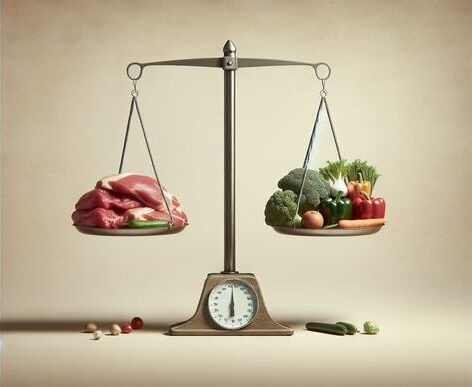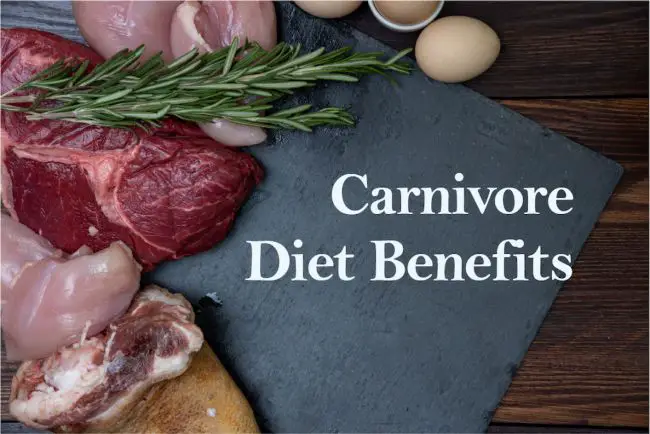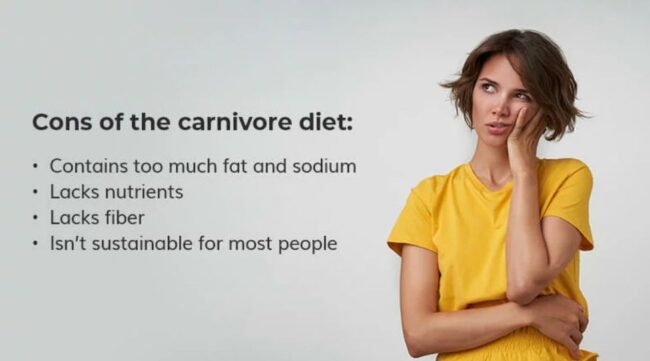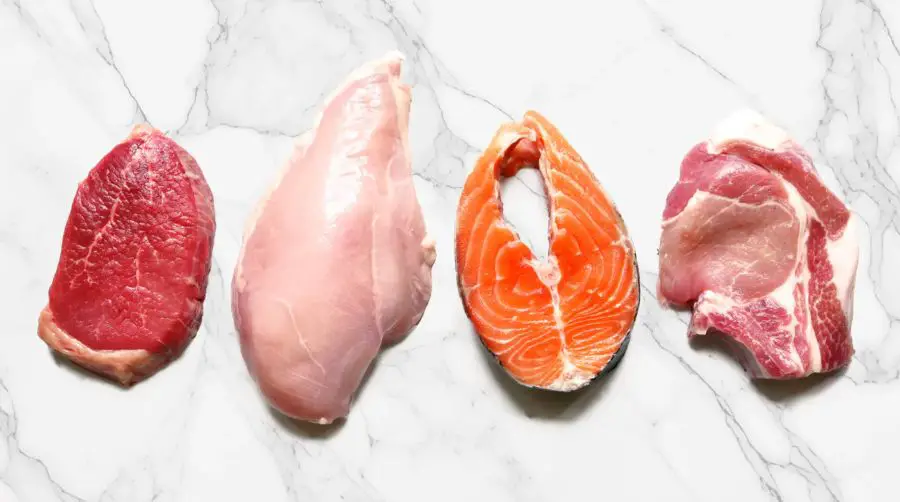In recent years, the carnivore diet has gained quite a following. From social media personalities to fitness enthusiasts, many people are drawn to its simplicity. They focus on eating only animal-sourced foods, primarily meat, fish, eggs, and sometimes dairy. Proponents also suggest the diet results in weight loss, decreased inflammation, and improved mental clarity. The simplicity of “just eat meat” is appealing, but there are some risks you may want to consider before going all in.. Based on your health status, it may or may not be effective for some (and every restrictive eating plan has its health risks).

Before you jump into the carnivore diet, let’s take a more in-depth look at the carnivore diet that could impact your long-term health.
Carnivore diet benefits, initial results
The carnivore diet is one of the most extreme forms of a low-carb, high-protein eating plan. While it would be right to refer to the carnivore diet as a low-carb, high-protein eating plan that requires adherents to abstain from all plant foods (as opposed to a paleo plan or keto diet), the carnivore diet does prohibit all plant foods, and thus, no vegetables, fruits, grains, legumes, or most seasonings (except salt).
The premise is that our species can survive on nutrient-dense animal foods, while omitting potentially problematic plant foods that some speculate contribute to digestive issues or inflammation. The carnivore diet’s simplicity is undoubtedly appealing, but by cutting out entire food groups altogether, serious nutritional questions arise.
Short-Term Benefits People Report
Carnivore diet advocates usually have good short-term outcomes, such as:

- Fast weight loss – due to less intake of overall calories and water loss.
- Less bloating or distress.
- For some, clearer skin, especially for people with previous issues with certain plant foods.
- Greater satiety – protein and fats offer fullness.
While these benefits sound good, if you are assessing a lifestyle change, it is easy to overlook the long-term view of carnivore diet risks you may notice over time.
Major Carnivore Diet Risks

1. Nutrient Deficiencies
The first significant carnivore diet risk is the possibility of omitting important vitamins and minerals. The good news is that most plants have fiber, vitamin C, potassium, and antioxidants, which are difficult or impossible to get from animal food alone. The lack of these important nutrients can lead to fatigue, depressed immune system performance, and long-term health risks and issues. For Example:
- A lack of fiber can negatively affect your gut health.
- Lack of vitamin C could hinder collagen production and immunity.
- Limited potassium may increase the risk of high blood pressure.
2. Gut Health and Digestive Health
Fiber helps the gut microbiome. A lack of fiber is not an ideal start for proper digestion. Many people have reported constipation when first starting a carnivore diet, which could be ongoing. Over time, biodiversity in flora and fauna can decline, leading to other health risks.
3. Heart Disease Risk Eating
A diet full of red and processed meats can increase cholesterol levels, but while some followers of the carnivore diet may have levels that remain stable, participants can themselves with a surge of LDL cholesterol, which is associated with heart disease, in addition to the extreme level of saturated fats and nothing to help with protective plant compounds associated with this carnivore diet risk.
4. Strain on the Kidneys
Protein consumption on a carnivore diet is excessive and requires a significant overload of kidney function. Those with pre-existing kidney conditions could worsen their condition. Even in people with healthy kidneys, excess protein can increase the risk of kidney stones over time.
5. Bone Health
Calcium and vitamin D can be obtained from dairy or fish, but no calcium could mean lower consumption of magnesium, which is sometimes included in plants. The plant and bond broad health risk with a carnivore’s diet could lead to greater chances of developing this imbalance over several years from now on.
6. Higher Cancer Risk
Studies indicate that diets high in processed and red meat are associated with increased risks of some cancers, particularly colorectal. This is made worse by the absence of fiber and antioxidants, which are both beneficial for cancer prevention, on the carnivore diet.
7. Mental and Emotional Blocks
Food is not only about nutrients; it’s also about taste, socialization, and variety. The carnivore diet can seem socially isolating, and the use of all these restrictions can also take a toll on your mind, making it even more difficult to continue.
Carnivore Diet Risks – Who Needs To Be Careful?
Some people will have increased carnivore diet risk factors, including:

- People with heart disease or high cholesterol
- People with kidney issues
- People with digestive problems, like constipation
- People who are at risk of osteoporosis
- Pregnant or breastfeeding women who require a broader range of nutrients
Tips If You Decide to Try It Anyway
Even if you’re still interested in the carnivore diet, here are some tips for lowering risks:
- Make sure to include a variety of meats, such as chicken and fish, as well. Consider organ meats as well to maximize nutrient availability.
- Track your blood work frequently, especially protein levels, cholesterol levels, kidney function, and essential vitamin levels such as vitamin C.
- Be sure to drink plenty of water and supplement with electrolytes.
- Discuss any dietary change with a qualified health professional.
Final Thoughts
The carnivore diet may seem like an easy solution to shed pounds or address certain health issues; however, the risks outweigh the benefits. Nutrient deficiencies, digestive concerns, cardiovascular risks, strain on the kidneys, and concerns related to long-term health all paint a concerning picture. While some people may feel positive effects initially, sustainability and overall health need to be the major concerns.
In the end, it’s important to evaluate the pros and cons. By evaluating the risks of the carnivore diet prior to trying it, you may avoid serious health ailments down the line. For long-term health, a balanced diet with a combination of animal and plant foods, generally, is a safer option and far more enjoyable.


